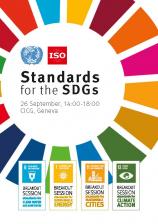
The Standards for the SDGs event took place as a side session to the 41st ISO General Assembly (GA) and brought together representatives of the standards community, UN agencies, corporate entities, diplomats and national policymakers. This multi-stakeholder engagement showcased the role of standards for the achievement of the UN Sustainable Development Goals (SDGs).
Please see the Event Flyer and current website for more details.
Background
The event explored the potential of voluntary standards as powerful tools in the achievement of the Sustainable Development Goals.
A standard is a document, established by consensus and approved by a recognized body, that provides, for common and repeated use, rules, guidelines and characteristics for activities or their results, aimed at the achievement of the optimum degree of order in a given context.
Programme
Please see and download the detailed final programme of the event.
Introduction to Standards Mapping Tool
- Lorenza Jachia, Secretary, Working Party of Regulatory Cooperation and Standardization Policies, UNECE
(presentation)
Case Studies by Breakout sessions
SDG 6 - Clean water and sanitation (all SDG 6 case studies)
Panel Session Moderator: Kathie Morgan, President, ASTM International
- Kene Carol Dick, Department of Water Affairs, Botswana
(case study)(presentation) - Janya Trairat, Department of Water Resources, Thailand
(case study)(presentation) - Francine Abiola, Water Sanitation Hygiene Specialist, Benin (ISO/PC 305 on "Sustainable non-sewered sanitation systems")
(presentation) - Marie-Claude Drouin, Francophone Standardization Network (RNF), Canada
(presentation)
Interactive Session:
- Valentina Fuscoletti, Department of Environmental Health, Italy
(case study)(presentation)
SDG 7 – Affordable and clean energy (all SDG 7 case studies)
Panel Session Moderator: Moira Patterson, Global Affairs Program Director, Institute of Electrical and Electronics Engineers Standards Association (IEEE-SA)
- Francisco Boshell, International Renewable Energy Agency (IRENA)
(presentation) - Liam McLaughlin, Ireland - UNIDO (ISO/TC 301 on "Energy management and energy savings")
(presentation) - Aleksandar Dukovski, Group of Experts on Energy Efficiency, UNECE
(case study)(presentation) - Bernardo Folly de Aguiar, Energy Research Office, Brazil
(case study)(presentation) - Ulises Neri Flores, National Hydrocarbons Commission, Mexico
(case study)(presentation) - José Carlos Flores, National Institute of Quality (INACAL), Peru and Herbert Mataruka, Zimbabwe Energy Regulatory Authority (ZERA), Zimbabwe and Sara Gobbi, Teresa Cendrowska, ASTM International
(case study)(presentation) - Georgii Rudko, State Commission on Mineral Resources, Ukraine
(case study) - Mai Elhafez, Ministry of Electricity and Renewable Energy, Egypt
(case study)
Interactive Session:
- Margalita Arabidze, Ministry of Economy and Sustainable Development, Georgia
(presentation)
SDG 11 – Sustainable cities and communities (all SDG 11 case studies)
Panel Session Moderator: Dr. Duncan Shaw, University of Manchester, United Kingdom
(presentation)
- Bernard Gindroz, ISO/TC 268 on "Sustainable cities and communities"
(presentation) - Ramy Ahmed Fathy, ITU-T SG20 on IoT and Smart Cities & National Telecom Regulatory Authority (NTRA), Egypt
(case study)(presentation) - Ramón Ferri, València City Hall, Spain
(case study)(presentation) - Åsa Kyrk Gere, ISO/TC 292 on "Security and resilience"
(presentation) - Teuku Faisal Fathani, Centre for Disaster Mitigation & Technological Innovation (GAMA-InaTEK), Universitas Gadjah Mada, Indonesia
(case study)(presentation) - Eliot Christian, National Oceanic and Atmospheric Administration (NOAA), United States
(case study)(presentation) - Steven Jensen, California State University Long Beach/ Red Cross Scientific Advisory Council, United States
(case study)
Interactive Session:
- Alexandre Bosshard, Department for Industrial Services and Technical Office, City of Pully, Switzerland
(case study)(presentation) - Duncan Shaw, University of Manchester, United Kingdom and Jenny Moreno, University of Chile, Chile
(case study)(presentation) - Margaret Lungu, Bureau of Standards, Zambia
(case study)(presentation)
SDG 13 – Climate action (all SDG 13 case studies)
Panel Session Moderator: Marion Verles, Chief Executive Officer of the Gold Standard Foundation
- Ana María Ruz, Chilean Solar Committee, Chile
(case study)(presentation) - Dr. Philippa Ryan, ISO/TC 307 on "Blockchain and distributed ledger technologies", Australia
(presentation) - Chikako Makino, ISO/TC 207 on "Environmental management"
(presentation) - Kofi Adu Agyarko, Energy Commission, Ghana
(case study)(presentation) - Emanuele Riva, Italian Accreditation Body, Italy
(case study)(presentation) - Philip Okungu Anyango, African Organisation for Standardisation (ARSO)
(case study)(presentation) - Matthew Matimbwi, Tanzania Renewable Energy Association (TAREA), Tanzania
(case study) - Pedro Faria, Carbon Disclosure Project (CDP)
(case study) - Gloria Ostos and Carlos Gadsden, Fundación Internacional para el Desarrollo de Gobiernos Confiables, Mexico
(case study)
Interactive Session:
- Veronica Ruiz, International Union for Conservation of Nature (IUCN), Switzerland
(presentation)
Breakout Session Documents
Concept Note: Standards for clean water and sanitation
Concept Note: Standards for sustainable energy
Case Study Submission
The submission of case studies is now closed. We thank all experts having submitted a case study.
Participants
The event provided a unique opportunity to connect the standardization community with high-level representatives of the United Nations agencies, Geneva-based international organizations and NGOs, the diplomatic community, and national policy makers, who do not usually have an opportunity to engage with standards-setting bodies.
Further Information
UNECE invites all interested parties to contact [email protected] for further information on the event, and to follow on the conversation on Twitter #StandardsfortheSDGs.
Acknowledgements
The contributions of ASTM International, the Institute of Electrical and Electronics Engineers (IEEE) and the Physikalisch-Technische Bundesanstalt (PTB) in support of the UNECE project on Standards for the SDGs are gratefully acknowledged.